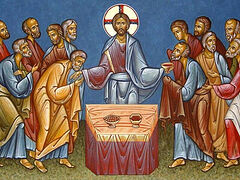Much to my surprise, some time ago the Nicene Creed was trending online among the Southern Baptists, America’s largest Baptist organization. They were, apparently, debating whether or not that Creed should be added to their official statement of faith. This was a bit controversial since the Southern Baptists are well-known for their position that they have “no Creed but the Bible”. Though it is hard for me to work up any enthusiasm or interest in what our Southern Baptist friends do with their official statement of faith, the news does provoke the question, “What’s so important about the Nicene Creed?” Or, in blunter terms, why should anyone today care about what a bunch of guys decided about 1700 years ago? Permit me to attempt an answer.
The Church has always cared a lot about unity—or, in more modern terms, inclusivity. Inclusivity is one of those magic modern words, words with which secular people seek to weave a spell. It is always good to be inclusive, to welcome everyone in, regardless of who they are, what they believe, or how they live. There are limits, of course, to modern secular inclusivity—they don’t welcome absolutely everyone, but secularism is so dominant that secularists can give the erroneous impression of welcoming absolutely everyone. People like White Supremacists are not welcome (to the secularists’ credit), but White Supremacists are sufficiently marginal enough so as to not disturb the impression of total inclusiveness. It is good to be inclusive, and bad not to be inclusive.
To an extent, the Church agrees, and therefore values its unity. That is why the Church speaks of “one, holy, catholic, and apostolic Church”—there are not two or more churches, but only one. There is not a church for Jews and another church for Gentiles. There is not (or should not) be a church for Greeks and another church for Russians. There is not a church for white people and another church for blacks. Nope; there is one single church, arranged on a territorial basis, and including within it Jews, Gentiles, Greeks, Russians, whites, and blacks. The Church is one and inclusive.
But although the Church values unity, it values truth even more. That is because the Lord did not inform us that inclusivity would set us free, but that the truth would set us free (John 8:32). Truth is therefore more important than unity. Or, put better, our unity is based upon our common acceptance of the truth.
Considerations of truth and error matter supremely to the Church because the Church is not just a collection of people (like the electorate, that long-suffering group). The Church is a body. That is, it is a group of people animated by the same spirit and having a life of its own. And bodies are, by definition, subject to disease, decay, and death. Human bodies can be killed by diseases, such as cancer. The Body of Christ can be killed by error, even as it is kept alive and free by truth. In other words, what cancer is to the human body, fundamental error is to the Church. Heresy and error are not simply wrong opinions; they are lethal disease. If not checked, healed, or excised, they will kill spiritual life.
That is why the Church became so excited when the heretical opinions of Arius spread like wildfire in the fourth century. Arius’ error was not minor and trivial (like guessing incorrectly who wrote the Epistle to the Hebrews). It concerned something absolutely fundamental—viz. the question, “Who was Jesus?” Was Jesus divine, or not? Arius, a presbyter in Alexandria, answered, “No, not divine.”
Admittedly the question was complicated. The Church had always taught that God was one—i.e. it had always confessed monotheism, a belief that there was only one God. And it also always taught that Jesus was the Son of God. Indeed, as far back as St. Ignatius of Antioch (d. ca. 107 A.D.) the phrase “Jesus Christ our God” had been used. The puzzle was how to combine these two beliefs, how to confess the full divinity of Jesus without compromising monotheism.
Arius’ solution was to cut the knot and declare that Jesus was not fully God. He identified “begetting” with “creating” (the Greek words admittedly did look very similar) and so concluded that by describing Jesus as “the only-begotten Son” it also meant “the created Son”. For Arius, God the Father alone was truly God, and before He begot a Son (splitting like an amoeba?) God was not a father. There was a time, therefore, before the Son existed. God the Father alone was God, and the Son was the first-created being, and not truly God.
This teaching, starting from Arius’ Alexandria, quickly created a firestorm, and divided the Church. To preserve the Church’s unity, the newly-friendly Constantine called a number of bishops to debate the question in Nicea in 325. A clear majority of them (the vote was something like 318 to 2) declared Arius to be a heretic and drafted a statement to that effect. If one wanted to continue to be a bishop, one would have to sign on to that statement.
The statement was a tweaked baptismal creed, the confession to which a convert had to assent before being baptized. Into that creed, certain additions were inserted. In the bit which spoke of Jesus, it added the words “light from light, true God from true God, begotten, not made, of one essence (Greek homoousios) with the Father, through whom [i.e. through Jesus] all things were made”. This constituted a clear confession of Jesus’ full divinity—a confession so clear and unambiguous that even a snake like Arius and his gang couldn’t wriggle out of it.
Of course, this didn’t settle it, and it took another generation of empire-wide debate for the Church at large to realize that the only real options on the table were Nicea or Arius. Other proffered options like “homoiousios”—of like essence—made no sense. Jesus was “like” God? Sort of God? God-ish? To a clear-thinking person, one is either fully God or is a part of His creation; there can be no such thing as a partially-divine demi-god. Eventually everyone in the Church realized this and sided either with Nicea (the majority of the Church) or with Arius. For the former, the Nicene Creed was the standard to which they flocked, the flag which they saluted.
The question today is: why does all this matter now? Or, come to that, why did it matter back then? The answer: because salvation depends upon worshipping Jesus and giving oneself to Him, body and soul. It depends upon giving to Jesus of Nazareth the same complete worship and allegiance that one gives to God Himself.
Obviously, one should not do this unless Jesus is fully divine. If Arius was right (along with his contemporary descendants) then Jesus is not God but is at best a kind of spiritual celebrity. Celebrities are wonderful, but one should not give to them the full and complete allegiance of heart and life. One can, I suppose, get their autograph, tell them of one’s admiration (“I’m your biggest fan!”), and put their poster on the wall. But giving one’s soul to them and living solely for them is not on. The official name for such lethal stupidity is “idolatry”.
Take, for example, a modern celebrity—someone like Taylor Swift (someone whose songs I have never listened to, but whose face I have to look at in countless magazines every time I go to the store to buy milk). A Taylor Swift fan might admire her talent and delight in her concerts, but no one but a lunatic would say, “For me to live is Taylor Swift”. But that is exactly what a Christian says about Jesus, beginning with St. Paul: “For me to live is Christ” (Philippians 1:21).
That is, a Christian is someone who has given his or her body and soul so completely to Jesus that life has no meaning apart from Him. This loyalty and allegiance cannot be legitimately given to anyone but God Himself, for God has long since told us that we must have no other gods before Him (Exodus 20:3). Celebrity alone doesn’t cut it; to give one’s soul to a celebrity is idolatry which damns the soul. But Jesus of Nazareth is God incarnate, light from light, true God from true God, begotten but not made, homoousios with the Father. It is through Him that all things were made—including us. We can and must give ourselves totally to Him if we would be saved.
That is why the Nicene Creed is so important—it enshrines for all time the reason why we should give our souls to another human being, the Man Christ Jesus. For this Man is also almighty God in the flesh, the Word of the eternal Father come down to dwell among us and save us. It does not really matter whether or not our Southern Baptist friends have this truth in their statement of faith. What matters is whether or not each of us has it in our heart.




